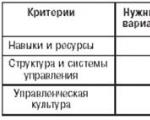Insufficient number of MIA investigators. Agent's bonus. Operators who work with informers want to be paid extra for the risk. A chance for change for the better
The head of the Ministry of Internal Affairs of the Russian Federation, Vladimir Kolokoltsev, has prepared a draft order according to which additional payments will be made monthly official salary operatives who communicate with secret agents and informants.
According to Life, recently experienced operatives began to leave the Ministry of Internal Affairs units designed to fight murderers, fraudsters, thieves, extremists and terrorists.
To support officers with rubles, the head of the Ministry of Internal Affairs of the Russian Federation, Vladimir Kolokoltsev, prepared draft amendments to order No. 65 of January 31, 2013 “On the procedure for providing monetary allowance employees of the internal affairs bodies of the Russian Federation."
According to the proposal of the head of the Ministry of Internal Affairs of the Russian Federation, Vladimir Kolokoltsev, operatives working with “secret agents” will be paid a monthly salary supplement in the amount of their official salary for the risk.
According to the Ministry of Internal Affairs of the Russian Federation, now the official salary of an operational officer ranges from 18 to 25 thousand rubles, depending on the length of service and the region in which the officer serves.
In Moscow, the Moscow region, and St. Petersburg, the official salary is higher than in all other regions,” says Life’s interlocutor from the Ministry of Internal Affairs of the Russian Federation, who is familiar with the situation.
According to him, the current shortage of personnel in the capital’s police is about 3.5 thousand people, and in Russia as a whole this figure can reach up to 30 thousand people.
The chairman of the coordination council of the Moscow Interregional Police Trade Union, Mikhail Pashkin, told Life that Vladimir Kolokoltsev’s order to pay operatives additional salaries for working with agents is a forced measure.
The minister, as a former operative, realized that it was time to save the situation. To retain detective professionals in the authorities and not to lose the agent network that has been developed over decades, says Mikhail Pashkin.
According to Pashkin, operatives, due to a lot of paperwork, simply stopped officially reporting to their superiors about working with agents.
After all, according to the law, an operational personal file is opened for each agent, where the operative is obliged to file all reports on meetings with his principal. And the chief of the operative checks these cases and informs his superiors about the work of the service with recruited agents,” says the police union leader.
So the head of the Ministry of Internal Affairs decided to incentivize operational employees with rubles. On average, a police officer in the criminal investigation department receives 50 thousand rubles. Half of the salary is the official salary. This means that now the officer will receive 75 thousand if he decides, of course, to start officially meeting with his agents and writing reports to management,” says Pashkin.
According to Life, every year all Russian security forces spend hundreds of millions of rubles on paying secret informants.
Yes, unfortunately, we can’t do it without volunteer helpers. They were in the tsarist secret police, in the Soviet police, and now they remain in the Russian police. But informants always received money for their work, says one of the operatives of the Main Directorate of the Ministry of Internal Affairs of the Russian Federation for the city of Moscow.
According to the detective, many crimes are solved thanks to the help of informants, but ordinary citizens can only guess about this. After all, all the activities of the informant are secret.
Agents are the holy of holies of detective work, and when you understand that the information received from an informant is very valuable, then you can budget money pay, and many work for the idea,” says the policeman.
In the summer of 2017, in the Vladimir region, it was thanks to police agents that Alexander Sharapov, a member of the bloodiest Orekhovsk-Medvedkovskaya organized crime group in Russian criminal history, who had been hiding from the investigation for almost 20 years, was detained.
Alexander Sharapov has five murders to his name, including the murder of one of the most famous killers in Russia - Alexander Solonik (Sasha the Makedonsky).

The police officers interviewed by Life consider the initiative of the head of the department to provide additional payments for working with informants to be correct.
Any risk, especially one related to human life, must be paid, says the officer. - After all, communication with agents is truly life-threatening. There were cases when the opera's assistants became enemies during intimate conversations and the tea party ended in bloodshed, in which the MIA officer did not always win.
Life sent a request to the Ministry of Internal Affairs of the Russian Federation with a request to comment on the initiative of the head of the department, Vladimir Kolokoltsev, on additional payments to operatives working with secret informants. However, Life was unable to obtain immediate comment.
Meanwhile, the Ministry of Justice approved an order from the head of the FSB of the Russian Federation on how the Pension Fund should take care of people who collaborated with the intelligence services. After transferring such information to the Pension Fund, the citizen’s period of cooperation will be counted towards the length of service. Thus, unofficial employees will receive a pension.
In July 2015, an updated law on operational investigative activities came into force, which more clearly stated that citizens collaborating with security forces have the right to apply for a pension. Each agency that is engaged in operational investigative activities must approve the procedure for transmitting information about experience social services. One of the authors of the law on pensions for secret cooperation was United Russia deputy Irina Yarovaya.
The biggest shortage is in the traffic police
In the last six months, the number of people leaving the ranks of the Don police has increased at will. This was announced on Tuesday, October 13, during a traditional meeting with journalists by the head of the Department for Work with Personnel of the Main Directorate of the Ministry of Internal Affairs for the Rostov Region, police colonel Timur Marunchak.
“We talk to employees, persuade them to be patient and not quit. But this doesn't always work. What is unfortunate: among those leaving are many qualified employees who have served for 10-15 years, but are leaving for civilian life or are being transferred to another duty station. So, many transferred to the central regions, where the load is less,” said Timur Marunchak.
It is the excessive workload, according to Marunchak, that is the main reason for dismissal.
— The workload on each employee in the Rostov region is truly colossal. In addition to their main duties, the police are involved in almost all political, sports, cultural and public events. For example, football. We are told that security should be provided by some specially trained people from private structures. In reality, the main burden falls on the police, Marunczak noted.
The biggest shortage is felt in the road patrol service (DPS). For example, in the Rostov regiment, with a staff strength of 500 people, there are about 70 vacant positions, and this is 35 crews. The first Don battalion is short-staffed - about 25-30 people. The second battalion of the traffic police stationed in Kamensk is the best equipped; only 2-3 positions are vacant there.
Timur Marunchak noted that in the periphery it is much easier to find people willing to serve in the police. The situation is most difficult in Rostov. Young people do not show much interest in this work, and those who would like to become a police officer do not always meet the requirements established when entering the service.
— For example, there is a strict requirement that a traffic police officer have a higher legal education. The same requirements for local police officers and investigators—a priori legal education. Some relief has been made for criminal investigation officers. They may have non-core higher education,” Timur Marunchak clarified.
The Rostov garrison also suffers losses due to employees dismissed for negative reasons.
“Since the beginning of the year, 182 people have been fired for bribes, drunkenness, repeated violations and other reasons,” Marunchak said.
The shortage of personnel is made up for by graduates of the RUI and employees who were laid off by ministerial orders. During the next optimization of staffing levels this year, 90 employees from the management apparatus of the Main Directorate of the Ministry of Internal Affairs for the Rostov Region, and 830 employees of private security were laid off.
“Some of them resigned, some transferred, but we tried to employ the majority by redistributing the staff using internal reserves. This applies primarily to territorial police departments. So, in one department an additional position is introduced, in another it is reduced, but in general the structure remains the same,” explained Timur Marunchak.
The topic of excessive workload on the Don police was discussed more than once, with the participation of both police officers and government officials. Deputies, at the instigation of the leadership of the headquarters, more than once appealed to Moscow with a request to increase the staffing level of the garrison. But every time they were refused. The only thing that was achieved was not a 10 percent, but only a 5 percent reduction in staff during the next optimization.
The efforts of the leadership of the Main Directorate of the Ministry of Internal Affairs undoubtedly deserve respect and praise, however, in informal conversations, employees complain not only and sometimes not so much about the workload, but about the outright tyranny of their superiors.
February 2015 turned out to be very unsuccessful for employees of the Russian Ministry of Internal Affairs: management almost completely stopped paying bonuses and limited the travel of police officers abroad. Since February 1, no new employees have been recruited, and a ten percent reduction in personnel is expected in the near future.
Our ranks are thinning
Perhaps State Duma deputy Alexander Khinshtein responded most loudly to the worsening situation of the police, sending a detailed letter to the Minister of Internal Affairs Vladimir Kolokoltsev.
“The reduction of the Ministry of Internal Affairs has begun! - writes Khinshtein on February 7 in his Twitter. - V. Kolokoltsev’s order was sent across the country: a ban on recruitment and bringing the shortage of personnel to 10 percent. Yes, there is no formal order to reduce the number. But this same sought-after 10 percent will be cut off due to the artificial creation of a shortage. He will be laid off later.”
According to Khinshtein, today there is a shortage (unemployed staff positions) in the Ministry of Internal Affairs system in the country as a whole is up to 3 percent.
Police service, after the recent reform and salary increase, is quite a prestigious type labor activity. And now, according to Alexander Khinshtein’s calculations, up to seventy thousand people may become unemployed.
Lenta.ru's source in law enforcement agencies notes that in the capital the share of unfilled positions is slightly higher - 5 percent. If the order for a ten percent reduction does come, about 7,000 employees will resign.
Standards are not a decree for us
During the 2011 reform, the police suffered a 20 percent reduction in personnel. According to a number of trade unionists, those who retained their workplace, now we have to work day and night to fulfill various indicators, which only increase from year to year.
Photo: Alexey Malgavko / RIA Novosti
For example, district police officers. Ten years ago, there was an order in the Ministry of Internal Affairs system that determined the degree of workload on each Aniskin. The district police officer was supposed to serve 3,500 residents, the senior district police officer - 1,500. These figures were not taken out of thin air, but the result of an analysis of many years of experience.
Since then, the same Moscow garrison has suffered two large-scale reductions and decreased by almost 40,000 people. And the population of Moscow has only increased over these ten years. The standards were revised and then completely sunk into oblivion.
Today, the workload of 6,000 people per district police officer is considered quite acceptable in the capital.
The Chairman of the Coordination Council of the Moscow Police Trade Union, retired police captain Mikhail Pashkin is concerned about the future of reduced law enforcement officers.
“Now there is nothing left for security companies to protect, and it is unknown where people who know how to handle weapons will go. Maybe they’ll go to Donbass, maybe they’ll create gangs, maybe something else, because former employees the police don't take much notice commercial organizations“,” Pashkin noted in an interview with the radio station “Moscow Speaks”.
A chance for change for the better
However, few share his concerns. Private security organizations, according to rumors, on the contrary, are happy about the upcoming layoffs in the police department - now they will be able to rejuvenate their personnel.
The official representative of the Ministry of Internal Affairs, Andrei Pilipchuk, responds to questions from journalists that the large-scale reduction of police officers is a rumor, not reality. The management of the department stands strong for its employees and will not cut them to the quick. There is a specific cost optimization plan, main goal which is maintaining the proper level of efficiency and combat effectiveness.
“Even with a 10 percent reduction in personnel, dictated by the real need to reduce budget expenditures, the Ministry of Internal Affairs can not only maintain the current level of order and security in the country, but also reach a qualitative new stage development,” ex-investigator of the Main Investigation Department of the Ministry of Internal Affairs of Russia Oleg Tyutenkov told Lenta.ru. - Need will force the leadership of the department to begin widespread implementation electronic document management, reducing overly bloated reporting and intermediate management. The police can become more mobile, faster and more efficient. I think that Vladimir Kolokoltsev is quite capable of playing the role of a revolutionary optimizer. He has determination and wisdom."
Don't they hire the police anymore?
Since February 1, the recruitment of new personnel to the Ministry of Internal Affairs has indeed been suspended, but this does not apply to applicants to departmental universities.
This summer, 300 first-year students will come to the Moscow University of the Ministry of Internal Affairs. In the fall, they will take the oath and receive the rank of police privates.

Photo: Dmitry Dukhanin / Kommersant
“There is a special formula that is used to calculate the approximate number of police officers who will retire or go on maternity leave in a few years. This figure is sent to the Ministry of Internal Affairs, and on its basis it is determined required quantity freshmen. So parents don’t have to worry: their children who are admitted to a departmental university will be guaranteed employment,” the head of the Department explained to Lenta.ru vocational training Main Directorate of the Ministry of Internal Affairs of Russia for Moscow, Colonel internal service Andrey Bukhanov.
Restrictions on police recruitment, according to experts, are a temporary measure, which in itself entails staff reductions. After all, no one stopped the dismissal process, which was sluggishly ongoing on a daily basis. Perhaps precisely in order to speed up this natural decline, and introduced a ban on employees traveling abroad.
Relaxing at home
The minister's order prohibits all certified police officers from leaving the country, with the exception of travel to the CIS countries, South Ossetia and Abkhazia.
According to media reports, this is not an order, but an instruction. IN open access this document does not exist.
Not only employees with top secret clearance, but everyone wearing shoulder straps were prohibited from traveling. These restrictions did not affect civilian employees.
It is difficult to judge what caused such a ban, but this is the next stage in the development of a trend that began several years ago. Last year, internal affairs officers' travel abroad was only possible with written permission from management. Previously, there was an order not to disclose abroad one’s affiliation with Russian law enforcement agencies. Before this order, in the same Crimea (still part of Ukraine), Russian police officers put notes on their arrival and departure on their vacation certificates from local law enforcement officers.
"Many police officers take vacation during the cold season. Now they have lost the opportunity to have a well-deserved rest under the warm sun with their family. What are their family and friends to blame for? - human rights activist and head of the All-Russian public organization"Officers of Russia" Anton Tsvetkov. “So far I have not heard any worthy arguments in favor of such restrictions.”
It is still unknown whether the departmental order of the Ministry of Internal Affairs applies to customs officers at airports. To do this, an interdepartmental decision must be made at the level of the country's government - or a corresponding law.

It is possible that the most cunning police officers will simply hide their affiliation with the internal affairs bodies and come up with various tricks.
Previously, travel restrictions applied to employees with top secret clearance, but some of them simply ignored departmental restrictions, hoping to keep their travels secret. Lenta.ru's source in law enforcement agencies said that one of these “restricted to travel” continued to deny and deny, even when the boss shoved fines for traffic violations sent from the European Union in his face.
However, honest law enforcement officers may now simply not have enough money to travel abroad. After all, bonus payments and financial assistance in the ministry from January 1 are significantly limited. And with one salary, in foreign currency terms, there is nothing to do abroad.
“The decision to restrict travel abroad was accepted by police officers with understanding,” summed up the official representative of the Ministry of Internal Affairs. - Since police officers are in the civil service, this imposes on them special responsibility, including a number of restrictions in certain circumstances.”




